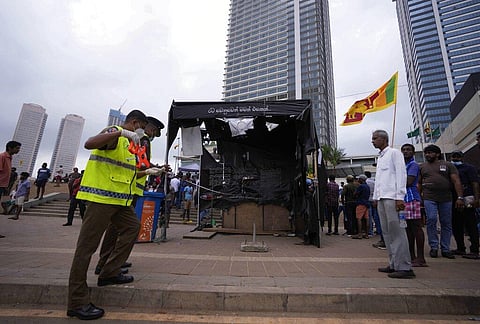China says 'closely following' violence in Sri Lanka; asks citizens to be alert
BEIJING: China on Tuesday said it is "closely following" the violent turn of events in Sri Lanka, where it has substantial investments, and asked the Chinese nationals working in the island nation to be alert and on guard against risks.
Beijing, while watching warily the fast unfolding of events in Sri Lanka, has not yet commented on the resignation of prime minister Mahinda Rajapaksa, who paved the way for large-scale Chinese investments, including in his hometown Hambantota port, which China took over on a 99-year lease as a debt swap.
Rajapaksa's resignation was seen as a setback for China as he promoted the Chinese investments, disregarding concerns from India and criticism from the US and western countries.
"The bloodshed and conflict took place in Sri Lanka's capital Colombo and other places, causing relatively large casualties," China's Foreign Ministry spokesman Zhao Lijian told a media briefing here on Tuesday while commenting on the dire situation in the island nation.
"Sri Lanka's police have enforced curfew so far. The Chinese side is closely following the development of the situation. We believe that with the joint efforts of all sectors of Sri Lanka, the country will regain peace and stability as soon as possible," Zhao said.
Despite its high-profile investments stretching over USD 8 billion in the last few years, China conspicuously kept silent on Sri Lanka's economic crisis leading to the declaration of pre-emptive default of all its foreign debt totalling USD 51 billion.
Beijing announced about USD 33 million (200 million yuan) assistance to Sri Lanka but is so far silent about its Ambassador to Colombo Qi Zhenhong's statement that China is considering a USD 2.5 billion credit facility to Sri Lanka.
The Beijing-based Asian Infrastructure Investment Bank (AIIB) is reportedly considering a USD 100 million loan for Colombo.
Weeks before his resignation, Mahinda Rajapaksa spoke to Chinese Premier Li Keqiang for assistance and his younger brother and President Gotabaya Rajapaksa urged visiting Chinese Foreign Minister Wang Yi last December to reschedule Sri Lanka's debt owed to China.
While maintaining silence on Sri Lanka's debt deferment, Qi was quoted in the Sri Lankan media criticising Sri Lanka's decision to approach the Washington-based International Monetary Fund (IMF).
Under the current uncertainty in Sri Lanka, Chinese enterprises will be more cautious in the long run when considering investment and expansion in projects, Qian Feng, director of the research department at the National Strategy Institute at Tsinghua University, told the Global Times on Tuesday.
Qian stressed that prospects for cooperation between China and Sri Lanka are still good, and the two sides are complementary in many aspects, but the current priority for Sri Lanka is to overcome the difficulties.
Chinese market watchers said that the majority of investments and projects that involve Chinese enterprises in Sri Lanka are those in infrastructure, and they will continue when the local economy improves, for the country still needs improvement in infrastructure even amid the turmoil.
Liu Zongyi, secretary-general of the Research Centre for China-South Asia Cooperation at the Shanghai Institutes for International Studies, told the daily that the political factor depends on the ruling party's attitude towards cooperating with the Chinese enterprises.
This will significantly affect the local business environment, although the overall prospect for Chinese enterprises remains positive.
Liu said that the influence of regional and global powers will also be an important factor.
For instance, the US and India have formed a joint posture against China in South Asia, so further cooperation between China and other South Asian countries, including Sri Lanka, might be disrupted.

